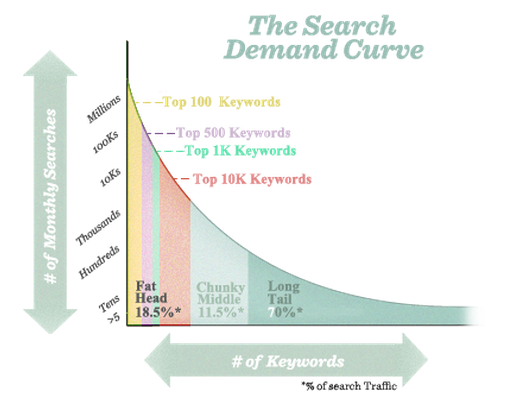 Before spending a ton of time and resources on optimizing your website for certain keywords, it is important to understand exactly what they are, and what is really driving your optimization goals. It’s easy to get caught up in data and competitive metrics, but if you spend too much time chasing the wrong goals you may end up hurting your business in the long-run.
Before spending a ton of time and resources on optimizing your website for certain keywords, it is important to understand exactly what they are, and what is really driving your optimization goals. It’s easy to get caught up in data and competitive metrics, but if you spend too much time chasing the wrong goals you may end up hurting your business in the long-run.
How Do Keywords Work?
Keywords are simply what someone types into the a search engine when they are looking for something online. Sometimes someone is searching for a particular website, other times they are searching for information about a particular topic, product, or service.
There are many types of searches and search intents, but in all scenarios, it’s the words or combination of words that get plugged into the search engine that ultimately lead a visitor to either your website or a competitor’s.
Whenever someone searches for a particular keyword, search engines compare that term against well over 200 metrics including both your site and basically every other site on the web. The search engines also look at a user’s personal browsing patterns and recent queries to try and extrapolate exactly what the user may be looking for.
Finally, the search engine delivers a set of results, ranked in the order they think will be most likely to provide what the searcher wants. Easy, right?
How Do Search Engines Use Keywords?
The answer to this is constantly evolving, but there are a few basics that are likely to be around for a while and are certainly worth exploring. Just don’t ever get too complacent or comfortable with your knowledge here.
It used to be as simple as specifying a list of keywords that might be relevant to your page in the form of a keywords meta tag. Rather than helping search engines, this quickly become a way to trick search engines into directing people to sites with less-than-deserving content, and this method has long been depreciated.
Since modern search engine algorithms no longer trust web authors to specify appropriate keywords, they now must instead analyze a myriad of factors about your website content and determine their own keyword valuations. The processing power that enables this calculation to be performed across a sea of indexed web pages on the internet with every search is mind-boggling! Even this outdated overview is pretty amazing.
There are two key takeaways here. The first is that search engines long ago stopped trusted web authors to choose their own keywords. The second is that search engines now decide whether your site is relevant or not to a particular search query, regardless of what you may want. This is a blessing and curse.
Quality vs. Quantity
Another key consideration is the breadth and depth keywords can have. Besides reflecting different search intents, there are also major differences in the specificity people enter into their queries.
Broad searches tend to have much higher search volumes. They also tend to be more competitive, because there are far more potential matches to those queries. Just look at the difference in average search volumes and difficulties for the following three keywords according to moz.com:
| keyword | competitive difficulty | searches per month |
| pizza | 75% | 255,324 |
| homemade pizza recipes | 49% | 1,348 |
| pizza delivery | 50% | 13,925 |
| neopolitan pizza delivery | 21% | too low to estimate |
| history of pizza | 52% | 502 |
If you run a pizzeria, it’s probably tempting to look at this data and think it’s a good idea to set a business goal of ranking for the keyword “pizza” because of the very high volume of searches being done for that keyword. Certainly, a high ranking for that keyword would be ideal!
However, this is a highly competitive keyword, and someone typing just that into a search engine could be looking for just about anything; pizza techniques, pizza nutritional content, information about pizza farms, pizza delivery in a completely different state than you, or even something entirely ridiculous!
The number of people searching for the more specific “pizza delivery” keyword in in your city is going to be significantly fewer than the broadly searched “pizza” keyword. But the odds of that person actually searching for the thing your pizzeria provides are also significantly higher. If you happen to deliver neopolitan pizzas, then this keyword is even more likely to be something that drives qualified potential customers to you!
Therefore, your business is probably better off ranking higher for more highly relevant, specific keywords than it would be for fewer keywords with higher volume.
These more specific keywords fall into what we call the “long tail” of keyword searches. It turns out that the vast majority of keyword searches that are performed are for long tail keywords, around 70% in fact. So even though the “pizza” keyword looks like it has the lion’s share of search queries each month, the reality is that this keyword isn’t as great as it may initially seem!

Optimizing Keywords
Once you’ve identified a keyword or keywords for which you want to rank higher, how do you go about optimizing your content for those keywords?
The first step here is to understand the limits of optimization. Over the years, we have had many clients who expect magic here. But the reality is that since search engines no longer trust web authors, there is a ceiling to how high your site can rank for a keyword. You simply have to have website content that is more relevant than the rest of the options out there.
Your pizzeria cannot suddenly decide to optimize its content for soccer equipment, for example. Your restaurant also cannot just do some “SEO work” and start outranking everyone else in town for whatever pizza-related keywords you want. True optimization focuses on making sure that your content is presented in the best possible way to realize its full potential.
If you want to rank higher and exceed your current potential, you likely need to go beyond traditional optimization efforts. You need to re-think the nature of the content you are presenting and start looking at the competitive landscape in a much broader way. Of course, traditional optimization is important, but this is just one tool in your arsenal.
Capacity Limitations
Tracking performance of various keywords each month can be a helpful way of showing you where you stand relative to your competitors. Looking at your Google Webmasters and Analytics data for data about queries that may be generating impressions and click-throughs for your site is also valuable. However, trying to get too quantitative in your approach may be a backwards way of going about things.
To truly optimize your site content for hundreds or even thousands of keywords could be a full-time job for a very large team of experts. Even in smaller doses, this mentality can lead to obsession over the performance of particular keywords that may not even be that valuable for your business. If you are generating quality content, your rankings will improve on their own. No gaming or SEO magic should be necessary if you’re doing things correctly.
We’re not advocating that you abandon keyword optimization methodologies or stop monitoring ranking stats. Both can be quite valuable and insightful when it comes to analyzing specific trends and performance opportunities. But time has told us that these SEO methodologies are more effective when based on sound overall content marketing goals. If you are chasing a few single keywords instead of focusing on your performance with larger numbers of specific long-tail keywords, you’re likely not using your online marketing resources as efficiently as you could.
Besides just your internal capacity for optimizations, there may also be a limitation for how many keywords websites other than Wikipedia can potentially rank. Most sites cannot be all things to all searchers, even within a single category.
A pizzeria site trying to rank for long-tail keywords by creating a plethora of content about homemade pizza, pizza history, delivery, and funny pizza videos may be overextending itself and diluting its potential for strong long-term rankings.
This is not a steadfast rule, by any means. It depends on the website, the content, the competition, and many other factors. But in our experience, it’s easy to lose sight of the reality that both content marketers and even websites themselves are inherently limited by capacity constraints. The real art of keyword management and improved rankings often comes from finding balance in these areas.
Finding A Practical Keyword Philosophy
If keyword data can be misleading, search engines can’t be gamed, and it can be inefficient to spend too much energy on optimization, then what might a smart and practical keyword strategy look like?
Don’t overthink it.
Look at your site content as a whole. Does it seem to be an accurate representation of the value you provide? Do you spend too much time focusing on one specific thing and not any of your other services or products? Does your content seem to be written more for human beings or tailored for robots and search engines?
By forcing yourself to generate content about all aspects of your business, you will naturally be generating content that aligns with larger numbers of long-tail matches. If the content is interesting to your readers, it will get noticed and shared, and those signals will go much further in search engine algorithms than just having some keywords stuffed into your paragraphs or headers, even though that is important as well — in moderation!

